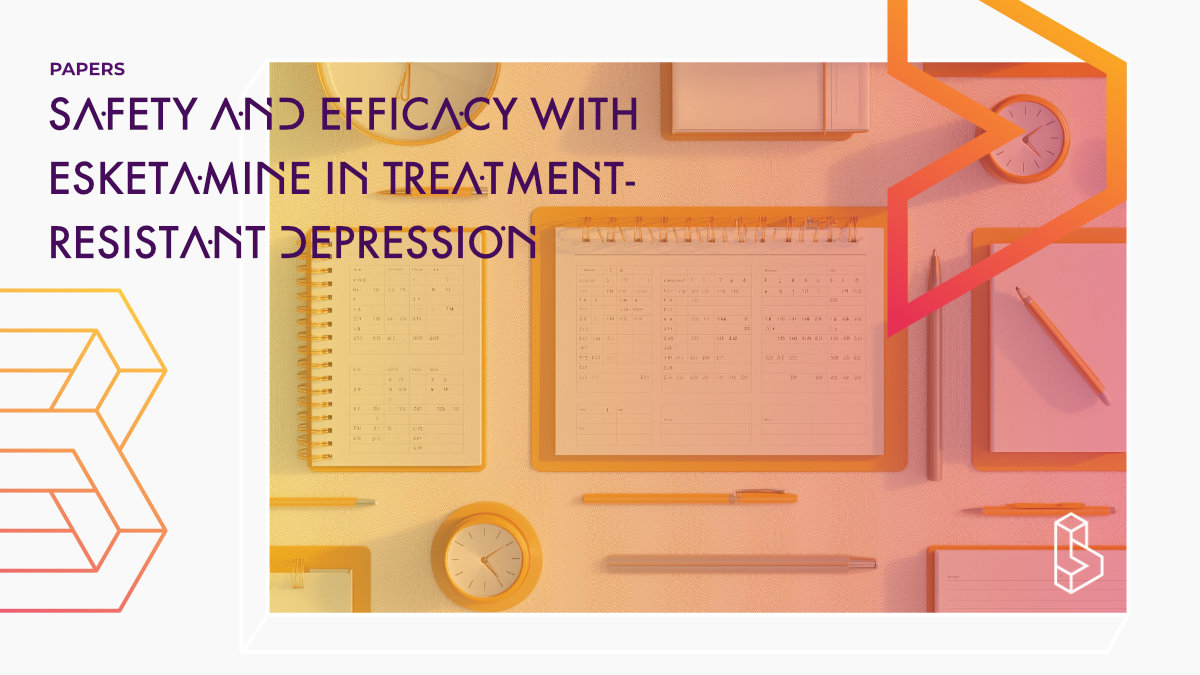This Phase III open-label extension study (n=1148) evaluates the long-term safety and efficacy of esketamine nasal spray combined with oral antidepressants in treatment-resistant depression (TRD) patients who previously participated in other Phase III trials. The study involved flexible dosing of intranasal esketamine (twice-weekly during induction, then weekly to monthly during maintenance) with direct staff supervision, with participants either entering through a 4-week induction phase (n=458) or directly into maintenance (n=690) based on their previous response.
Abstract of Safety and Efficacy with Esketamine in Treatment-Resistant Depression
“Importance The rates of relapse and suicide risk are higher in treatment-resistant depression (TRD) versus non-treatment-resistant major depressive disorder. Even among patients with TRD who initially respond, the majority (70%) relapse within 6 months.
Objective To evaluate the long-term safety and efficacy of esketamine nasal spray, combined with an oral antidepressant, in patients with TRD.
Design Phase 3, open-label, single-arm long-term extension study (SUSTAIN-3) conducted from June 2016 to December 2022
Setting Outpatient
Participants Adults with TRD who participated in ≥1 of 6 phase 3 “parent” studies continued esketamine by either entering a 4-week induction phase followed by an optimization/maintenance phase of variable duration (n=458), or directly entering the optimization/maintenance phase of SUSTAIN-3 (n=690), based on their individual response to study drug at the endpoint of the parent study.
Interventions Intranasal esketamine dosing was flexible, twice-weekly during induction and individualized to depression severity during optimization/maintenance (weekly, every-other-week, or every-4-weeks), under direct supervision by site staff.
Main Outcomes and Measures To assess long-term safety of esketamine. Efficacy endpoint included change in depressive symptoms, assessed by Montgomery-Åsberg Depression Rating Scale (MADRS).“
Authors: Naim Zaki, Li (Nancy) Chen, Rosanne Lane, Teodora Doherty, Wayne C. Drevets, Randall L. Morrison, Gerard Sanacora, Samuel T. Wilkinson, Allan H. Young, Acioly L. T. Lacerda, Jong-Woo Paik, Vanina Popova & Dong-Jing Fu
Summary of Safety and Efficacy with Esketamine in Treatment-Resistant Depression
Treatment-resistant depression (TRD) remains a critical clinical challenge due to its high relapse rates and elevated risk of suicide when compared to non-treatment-resistant major depressive disorder (MDD). Even among patients who initially respond to treatment, approximately 70% experience a relapse within six months. This underlines the need for effective and sustainable treatment strategies. Esketamine, the S-enantiomer of ketamine, administered as a nasal spray alongside a traditional oral antidepressant, has been approved by various health authorities globally for TRD based on short-term and one-year studies demonstrating its efficacy and safety.
To further understand esketamine’s long-term impact, the SUSTAIN-3 trial was launched. This global, Phase III, open-label, single-arm study sought to evaluate the extended safety profile, including cognitive, hepatic, and renal effects, and the durability of esketamine’s antidepressant effects in adults with TRD. The study builds on interim results published previously, with the current paper presenting additional data from over 1,000 patient-years of esketamine treatment.
Methods
Study Design
The SUSTAIN-3 trial ran from June 2016 to December 2022 across 222 sites in 27 countries. It comprised two parts: a 4-week induction phase and a longer-term optimisation/maintenance phase. Patients from six earlier Phase III trials (referred to as parent studies) were enrolled based on their clinical status at the end of those trials. Those who had not achieved a sufficient treatment response entered the induction phase, while responders were allowed to progress directly into the maintenance phase.
Participants
Find this paper
Safety and Efficacy with Esketamine in Treatment-Resistant Depression: Long-Term Extension Study
https://doi.org/10.1093/ijnp/pyaf027
Open Access | Google Scholar | Backup | 🕊
Cite this paper (APA)
Zaki, N., Chen, L., Lane, R., Doherty, T., Drevets, W. C., Morrison, R. L., ... & Fu, D. J. (2025). Safety and Efficacy with Esketamine in Treatment-Resistant Depression: Long-Term Extension Study. International Journal of Neuropsychopharmacology, pyaf027.
Study details
Compounds studied
Ketamine
Topics studied
Depression
Treatment-Resistant Depression
Safety
Study characteristics
Open-Label
Follow-up
Participants
1148
Humans
Compound Details
The psychedelics given at which dose and how many times
Ketamine 28 - 84mg | 44x
Linked Clinical Trial
A Long-term Safety Study of Esketamine Nasal Spray in Treatment-resistant Depression (SUSTAIN-3)This open-label, long-term extension safety study (n=1146) of esketamine Nasal Spray (Spravato) in treatment-resistant depression (SUSTAIN-3) aims to assess the safety and tolerability of Spravato in participants with treatment-resistant depression (TRD).

